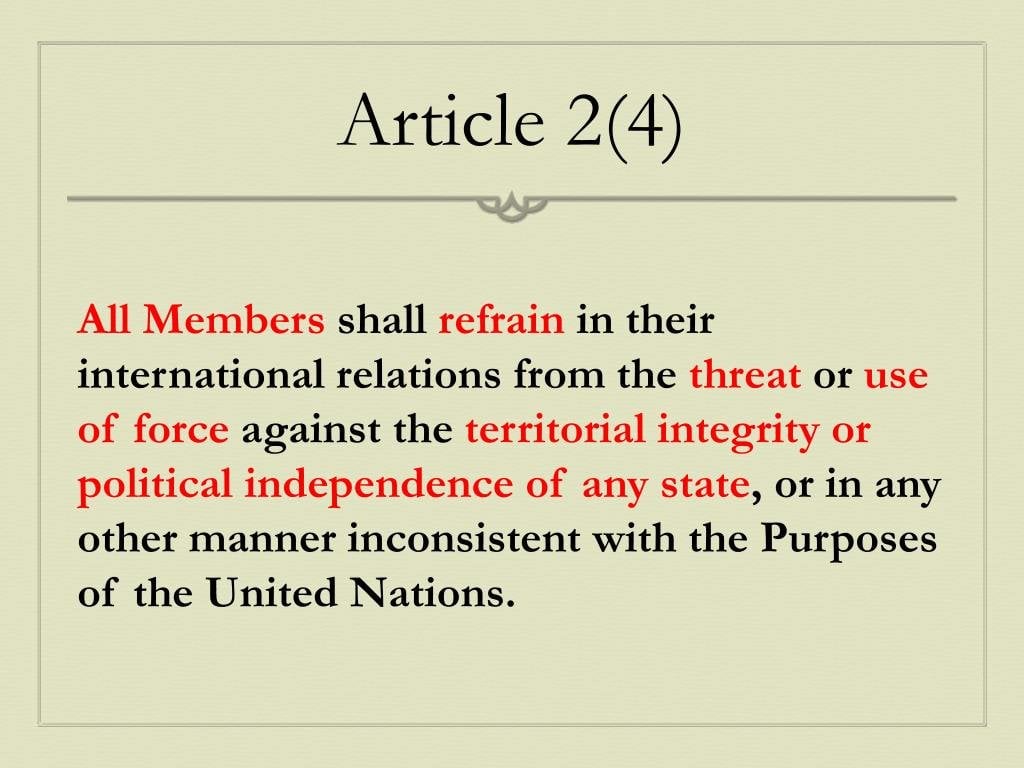Article 2(4): Is It on the right path?

After the devastating first world war the world community, mainly the actors of the world community at that time( Britain and France) came to the conclusion to establish an umbrella organization for maintaining peace and developing a forum for handling international disputes before they flared up into military action and caused a domino effect of warfare. From that conclusion, The League of Nations officially came into existence on 10th January 1920.
The idea of the League of Nations was to prevent wars through disarmament, collective security, and negotiation but due to a lack of collective effort, inclusion and lack of institutional strength League Of Nations failed. The effort made by Woodrow Wilson to form the international organization which had its basic principle in the Fourteen Points just went in vain but the importance of institutional cooperation laid its foundation. Britain and France, the two most influential members, ignored the League in their efforts to appease Hitler - actions that arguably led to the outbreak of the Second World War.
After the second world war, the actors of the global community again gathered to form an international organization with the aim to prevent further war. It led to the establishment of the UN. UN charter came as the founding document of the UN which was more specific and inclusive. However, in this recent scenario, the promise envisioned in the UN charter with regard to peace and security is disrupted.
UN has prohibited the use of force by the inclusion of Article 2(4). Has it been dully respected?
Some Recent Instances -
1) The United States launched a military campaign against the terrorist network, AI-Qaeda following the devastating terrorist attacks on the World Trade Center on September 11, 2001, without the formal
invocation of Article 2(4) of the U. N. Charter. The US government defends its act as the customary practise of international law and an act of self-defence under Article (51)of the UN charter.
2) United States initiated an invasion of Iraq, based upon claims that the government of Saddam Hussein possessed weapons of mass destruction (WMD). that will eventually threaten the peace of the middle east. The justification for the war against Iraq was based on the Bush doctrine of pre-emptive war and acts of self-defence.
3) Russia's Invasion of Ukraine also challenged the relevancy of Article 2(4).
Russia has sought to justify its actions in Ukraine by reference to the doctrine of self-defence. President Putin referred expressly to Article 51 of the UN Charter for his act against Ukraine.
Now the question here remains, Who determines the act with regard to self-defence? Thomas Franck in his article 'Who Killed Article 2(4)?' has already questioned the relevancy of this matter in this realpolitik Oscar Schachter in his famous book 'International Law in Theory and Practice' stated that neither human rights, democracy, nor self-determination are acceptable legal grounds for waging war, nor for that matter, are traditional just war causes or righting of wrongs.
To have the proper implication of Article 2(4) in collaboration with Article (51) commitment must be made to collective security action and collective self-defense. Collective action will meld these actions into a more effective system for dealing with the issues of the use of force in a changing world.


Leave Comment